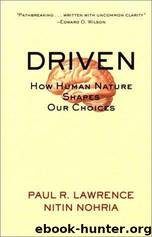Driven: How Human Nature Shapes Our Choices by Paul R. Lawrence; Nitin Nohria

Author:Paul R. Lawrence; Nitin Nohria [Nohria, Paul R. Lawrence; Nitin]
Language: eng
Format: epub
Tags: Motivational & Inspirational, Sociology, Office & workplace, Psychology, Psychology: Professional & General, Management, Political Science, Business & Economics : General, Social Science, Business Life - General, Physiological Psychology, Social Psychology, Business & Management, Humanism, Self-Help, Social Studies, Ethical & social aspects of computing, Business & Economics, Movements - Humanism, General, Motivation (Psychology), Psychology : Social Psychology, Behavioural theory (Behaviourism), Movements
ISBN: 9780787963859
Publisher: Jossey-Bass
Published: 2002-09-08T22:00:00+00:00
Figure 8.1. Derived Emotions Arrayed on a Four-Drive Grid.
COGNITION AND SELF-DETERMINATION
Edward Deci, in The Psychology of Self-Determination,' Pushes Plutchik's treatment of the role of emotion in human behavior a significant step further by bringing up the age-old question of free will-from a psychologist's rather than a philosopher's perspective. He credits William James with being the first psychologist to treat the subject in some detail. For James, will was the desire for an outcome that the individual thought was attainable, in other words, a state of mind that preceded voluntary behavior.
Deci credits the well-known social psychologist Kurt Lewin with further clarifying these points. For Lewin, "there are three phases to an intentional action: a struggle between motives, a decision or intention that ends the struggle, and the . . . action itself"(, The strength of the resulting action does not depend on the intensity of the intention but rather on the intensity of the drives upon which the intention rests. Lewin then stated that "an intention that is not based on a natural need (such as a drive) will surely fail." These observations are central to our argument as to how the four drives are combined with the conscious decision-making process in humans. In our terms, the independence of the four drives-that is, their noninterchangeable nature-necessitates an internal mental struggle among them that forces itself into consciousness for resolution. The struggle is resolved by the intentional act of will that leads to an action that is, in turn, energized by the relevant drives.
Deci describes this internal struggle in some detail, pointing out that people are frequently aware of more than one motive at a time:
While it may be possible to select a goal that will satisfy all of these motives simultaneously, typically that will not be the case. People must therefore decide which one or ones to attempt to satisfy at that time; the others must be held in abeyance. When there is only one motive, there is less need to recognize people's capacity for willing. However, with several motives, one must sift among the motives and select the one or ones that will be operative, and hold in abeyance the motives that were not chosen for satisfaction. It is particularly the function of holding motives in abeyance that necessitates the concept of will.-
Deci also strengthens our perspective by criticizing the rational choice theory ftvored by economists, or as psychologists say, the "cognitive theories of choice." Such theories, he argues, largely ignore the role of emotions in the choice process. On the contrary, Deci maintains, "emotions play a vital role in the motivation of behavior."s
Deci moves on to offer his own definition of will and selfdetermination that fits precisely with our thinking. "Will is the capacity of the human organism to choose how to satisfy its needs.... Self-determination is the process of utilizing one's will... Willing is a necessary aspect of healthy human functioning." Thus, self-determination is a direct product of independent, noninterchangeable drives such as the four we hypothesize. This
Download
This site does not store any files on its server. We only index and link to content provided by other sites. Please contact the content providers to delete copyright contents if any and email us, we'll remove relevant links or contents immediately.
Rewire Your Anxious Brain by Catherine M. Pittman(18280)
Talking to Strangers by Malcolm Gladwell(12863)
The Art of Thinking Clearly by Rolf Dobelli(9903)
Mindhunter: Inside the FBI's Elite Serial Crime Unit by John E. Douglas & Mark Olshaker(8695)
Becoming Supernatural by Dr. Joe Dispenza(7830)
Change Your Questions, Change Your Life by Marilee Adams(7367)
The Road Less Traveled by M. Scott Peck(7273)
Nudge - Improving Decisions about Health, Wealth, and Happiness by Thaler Sunstein(7237)
The Lost Art of Listening by Michael P. Nichols(7154)
Mastermind: How to Think Like Sherlock Holmes by Maria Konnikova(6932)
Enlightenment Now: The Case for Reason, Science, Humanism, and Progress by Steven Pinker(6868)
Win Bigly by Scott Adams(6822)
The Way of Zen by Alan W. Watts(6286)
Daring Greatly by Brene Brown(6220)
Big Magic: Creative Living Beyond Fear by Elizabeth Gilbert(5347)
Grit by Angela Duckworth(5294)
Men In Love by Nancy Friday(4962)
Ego Is the Enemy by Ryan Holiday(4948)
Altered Sensations by David Pantalony(4862)
